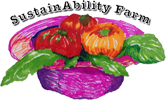NEWSDAY
10/02/2011
Learning life skills and focus in the garden
Originally published: September 29, 2011 3:26 PM
Updated: September 30, 2011 8:13 PM
By KAY BLOUGH Special to Newsday
Photo credit: Newsday / Alejandra Villa | Ian Webrock practices with a tilling tool at the SustainAbility garden for autistic adults at the Planting Fields Arboretum State Historic Park in Oyster Bay. (Sept. 13, 2011)
Volunteers bend over rows of eggplant, kale and peppers, quietly working their hoes as they weed and harvest a one-acre garden plot at Planting Fields Arboretum State Historic Park in Oyster Bay.
A series of steady thunks floats over the air as the hoes hit the ground on a recent weekday morning. Even a light drizzle didn’t prevent several hardy volunteers from doing late-season harvesting and cleanup in their SustainAbility garden, which was carved out of a meadow at the arboretum.
The volunteers are part of a group of nearly a dozen autistic adults who, along with their parents and support staff, are working to develop life skills that will sustain them and help give their lives focus.
“Our end goal is to have a farm comprised of adults with developmental disabilities and adults without development disabilities living together,” said Wendy Kaplan of Locust Valley, a driving force behind the effort that was the idea of her daughter Rachel, 26, who is autistic and communicates by typing.
With the help of Daly Clement, a farmer-educator who teaches participants how to care for the garden, a core group of about 10 volunteers with disabilities on the autism spectrum began tending the garden this spring.
Autism is a developmental disorder that affects the brain’s normal development of social and communication skills. It affects about one in 110 children, and an estimated 1.5 million individuals in the United States, according to the advocacy group Autism Speaks. Other disorders related to autism spectrum include Asperger’s syndrome, Rett syndrome and childhood disintegrative disorder.
The state provides funding to pay for the support workers through the volunteers’ Consolidated Supports and Services plans, and Kaplan sold 12 shares as a Community Supported Agriculture plan to help fund the garden. The Consolidated Supports and Services plans give those with developmental disabilities a chance to build a life that supports their interests.
Daughter inspires
One day Rachel, the Kaplans’ younger daughter, typed “I want to live on a farm” in response to a question about what would be the best living situation for her, apart from living with her parents, Wendy and Gary.
Rachel Kaplan wrote that she learned about farming from summer vacation stays in Canada at a nonworking farm residence for teens with autism, and cemented that interest when one of her support workers, Alethea Vasilas, took Rachel to her family’s organic farm in Orient and taught her how to do some of the chores.
“There was such peace,” Rachel Kaplan typed about her experience in Canada. “The happiness I’ve derived from farming is taken from my experience with Peter and Alethea Vasilas. They taught me how to use my strength to perform the real hard work. All through the summer I have put my mind to being the best farmer. It has been hard but it has really taught me to use my strength. Now I belong in the farming profession. Farming reaps many individual harvests.”
The path to getting a farm with residential services for autistic adults and those with other developmental disabilities off the ground is long and winding, but the SustainAbility Services Inc. garden is a good start on training the volunteers and having them learn whether this is the type of work they want to be involved with, Wendy Kaplan said.
Planting Fields agreed to allow the group free use of the meadow and provides water to the site. It is likely the arrangement will continue next year as Kaplan seeks a permanent home for the farm. That’s fine with Planting Fields, said George Gorman, deputy regional director of the New York State Office of Parks, Recreation and Historic Preservation.
“It’s a great program,” he said. “It’s worked out extremely well. We’re very happy they started it this year. We anticipate it continuing.”
There are several residential farm programs nationwide for people with autism, including a well-known one for autistic adults at Bittersweet Farms in Ohio, but none on Long Island, according to Kaplan.
“We want our adult children to be integrated into our family lives,” she said. “There are no eyes that are going to be as important in my daughter’s future as family eyes.”
Learning process
The garden has been a revelation for the support staff and parents.
“Coming out here and working, learning new tasks and maintaining them over the summer is a much bigger transition for our volunteers than it would be for many,” Kaplan said. “It’s very exciting to watch their skills get better.”
Farm educator Clement agrees, noting workers have learned multiple tasks and how to transition from one to the other. Volunteer Danny Mulvaney, 24, of Baldwin is a good example.
“Danny’s improvement over the summer has been remarkable. He’s consistent, and he can work longer,” Clement said. “At first, he would work 10 minutes and that was good. Now he works, takes a break and then comes back and works longer.”
Ian Werbrock, 28, of Bay Shore, and his support worker, Lynn Cisek, spent a recent morning harvesting cherry tomatoes that survived Tropical Storm Irene and then weeded a row of pepper plants. Cisek helped him use a spike-wheeled weeder and handed him a hoe when he wanted to shift to a different tool. After seven years together, they share an easy camaraderie as they work.
“The rhythm of the hoeing and weeding he gets into, so this was a perfect fit,” Cisek said.
Werbrock, who also communicates by typing, wrote: “The farm is an oasis for me. It is a place where I can be peaceful and productive at the same time. The farming experience has made me rethink my educational goals. I enjoy college courses but think that perhaps courses in farming might be a good direction in the future. This remains to be seen and I am pleased with my options.”
His mother, Linda Werbrock, hopes a farm will become a viable alternative. “They’re really learning about farming and the skills of a farmer with an eye toward having a community where people with autism could be a family,” she said.
The physical labor is good for her son, she added, but the routine also is important. “Here, there’s no pressure,” Linda Werbrock said. “There’s a very comfortable atmosphere because there’s a measured routine that’s soothing.”
Tom Kramer-Miller, 24, a garden volunteer from Valley Stream who also helps out at the Gerald Ryan Outreach Center food pantry in Wyandanch, delivers some of the farm’s extra produce there.
“Their concept of him has changed over the summer as they see him bring in this produce,” Kaplan said. “The farm has a ripple effect out into the community.”
Kramer-Miller, who is very handy and had some experience gardening at home, organized the tangle of hoses for watering the plot. “We split it so one set of hoses is for one section, and we also have it so one hose is sprinkling while with the other hose you can walk to what we can’t reach with sprinklers,” he explained.
Donna Irving, Kramer-Miller’s support person, said the garden has offered good focus for him and expanded his social network. “We’ve become friends with others who work on the farm,” she said. “And he’s initiating taking on tasks. He’s interested in it and has real pride in it.”
The SustainAbility group will keep exploring how it might become self-functioning and self-sustaining. Barring a benefactor who donates land or sells it to the group at a bargain, it will be years before the farm becomes a reality.
“I’m hoping it’s not too long a road,” Kaplan said. “Once we get the land, I think a lot of things will come into place.”





